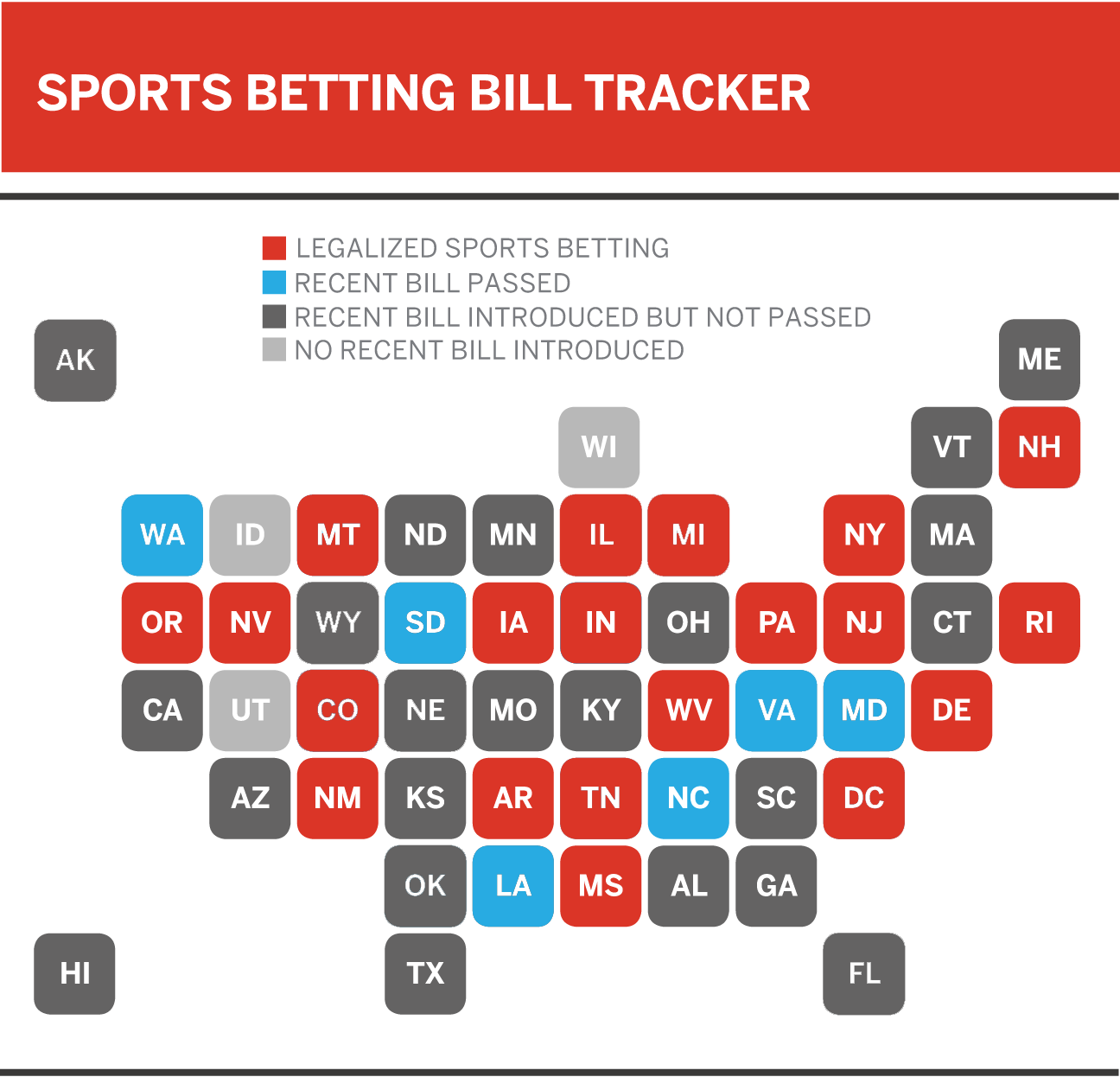Federal Law Regarding Sports Gambling

In the United States, both the Federal government and individual state governments are responsible for regulating gaming within their jurisdiction. The Federal government has designated some forms of gambling as prohibited within the US and has created laws that are non-negotiable in the regulation of such prohibited activities. On this subject, the Federal government may outlaw any form of gambling and states must abide by their law as Federal regulation will always trump state laws. It is important to any country’s gambling laws in order to stay within the country’s legal guidelines.
WASHINGTON (AP) — The Latest on the Supreme Court ruling striking down a federal law that bars gambling on football, basketball, baseball and other sports in most states (all times local): 10:45 p.m. The Supreme Court has cleared the way for states to legalize betting on sports, breaking a longtime ban and creating a potential financial boon for states and the gambling industry. The Professional and Amateur Sports Protection Act was the overarching federal law governing sports betting in the US. Passed in 1992, PASPA banned 46 states from having any type of state-sponsored sports betting, including physical and online sportsbooks. The court, in a 6-3 ruling, struck down a federal law that required states to ban gambling on the outcome of sporting events. The Professional and Amateur Sports Protection Act was highly unusual. Only two locations would be allowed to offer sports betting under the law, with the state's lottery providing regulatory oversight. In early 2019, the law was tweaked to provide for mobile betting.
States, however, are permitted to maintain their own regulations and prohibitions on acceptable forms of gambling as dictated by Federal regulations. So long as state laws align and do not challenge or disobey Federal gaming laws they are free to control, oversee, and manage to gamble within their state. Usually, states create and employ gaming control boards or special gaming commissions to supervise gambling activities within their state borders. State laws are subject to their specific state and do not have jurisdiction or power to control laws in other states. Therefore, gambling laws can differ greatly between states.
Active Federal Laws And Regulations In The United States That Affect Online Gambling
The United States maintains several significant federal gambling laws that greatly affect how gambling is regulated and permitted throughout the nation. Each law provides its own in-depth explanation, reasoning, and history behind its creation and implementation. On this page we summarize the laws, however, to gain a comprehensive understanding of the background of each federal law simply follow the highlighted links to resource guide that provides a greater depth of explanation.
Federal Wire Act – To combat prolific organized crime surrounding illegal bookmaking, then President John F. Kennedy enacted this law which effectively outlawed betting businesses from using phones to accept, place, or transmit interstate or foreign wagers on sports. At the time, this federal law greatly minimized domestic mafia bookmaking operations. The law has recently been interpreted by the US Department of Justice as effectively prohibiting U.S. based online sportsbooks from operating within the nation’s borders. Therefore it is a crime to operate an online sportsbook on US soil. The law does not prohibit USA residents from engaging in online sports betting at a legitimately licensed and regulated sportsbook that is legally operating outside of the United States.
DOJ Formal Opinion – In 2011, the DOJ and the Office of Legal Counsel released a memo that explained their formal interpretation of the Federal Wire Act that countered against the previous position the Criminal Division of the DOJ had taken. The memo stated that their prohibition on US-based Internet gaming only applied to online sports wagering. This clarification effectively allowed U.S. states to determine their destiny regarding online gambling as long as it doesn’t entail betting on sports. Therefore online casinos and poker sites are now legally permissible should a state decide to legalize these forms of betting entertainment.
UIGEA – This federal law is specifically aimed at online gaming operators and online gaming payment processors to curb illegal financial crimes, fraud, and money laundering through internet gaming activities. Financial institutions were thus barred from permitting direct transactions to online gaming service providers and given specific regulations on how they may process such transactions. In essence, the law provides regulatory oversight regarding how the online gambling transactions of USA residents are processed. The law does not make online gambling illegal.
PASPA – Once acted as the governing law over the prohibition of brick and mortar sports wagering throughout the US, with the exception of four exempted states. These four states had already implemented some type of active sports wagering or had pending sports legislation in place by a specified deadline and therefore were deemed exempt from the restrictions enacted by PASPA. The exemption was also offered to New Jersey due to their thriving Atlantic City gambling entertainment market, however, the state failed to take advantage of this option and allowed the deadline to pass. However, in 2018 SCOTUS reviewed PASPA and on May 14th ruled it unconstitutional and void. This law is no longer effctive in the land of the free.
RAWA – A preemptive bill yet decided upon intends to rewrite the Federal Wire Act of 1961 to extend prohibitions to include all forms of online gaming. If passed, this law would violently impact the current and future USA online gambling market as it does not include carve-outs for existing state-regulated online gambling platforms such as those initiated in Delaware, New Jersey, and Nevada – effectively making all online gaming in the USA illegal immediately.
State Gambling Laws
Individual states maintain the authority to allow or prohibit any form of gambling within their borders that are not expressly prohibited by US federal gambling laws. Due to the differing climate of states and their individual positions regarding legal forms of gambling entertainment, it is crucial to provide up to date information on what each US state permits and forbids in order to deliver the most accurate information for our readers. Therefore, we have specialized state focused pages to deliver the most current information on gaming laws and permissible gaming entertainment within their borders. Not only that, we provide here a state-specific gambling entertainment bill tracker to keep Americans updated on upcoming legal forms of betting entertainment in their state and inform them of newly enacted or retracted gambling laws.
Who Regulates Gambling in The United States?
At the federal level, there are multiple agencies that have a say in the regulation of U.S.A. gambling, these figures include the Department of Justice, the Federal Bureau of Investigation, the US Supreme Court, the House of Representatives, Congress, and even the President. All of whom communicate with one another and utilize the US constitution and precedent laws to determine the eligibility and legality of pending gambling legislation and regulations. At the state level, senators and congressmen in government positions lobby, direct, and discuss possible gaming legislation to either generate, permit, and regulate various legal forms of gaming entertainment in their state.
However, state governments often create sanctioned oversight boards such as Gaming Control Boards or Gaming Commissions to authorize, supervise and regulate legalized gambling activities within their state. Certain states in the USA may only have limited forms of legal gaming and therefore consolidate administrative power to existing commissions such as Lottery Commissions that are then tasked to regulate lotteries and limited forms of gambling such as charitable gaming in this case.
Forms of Legal Gambling in The United States
There are a variety of legal forms of gambling within the United States, however, these permitted venues are not uniform across state lines and players interested in engaging in these activities should check with local state laws to ensure lawful participation. As identified by the American Gaming Association the following forms of gaming entertainment are legal in the US: brick and mortar commercial casinos, tribal-run casinos, public and private poker rooms, bingo halls, various charitable gambling venues offering games such as raffles, pull-tabs, paddlewheel, punchboards, and casino nights, table games, on-track and off-track pari-mutuel wagering on horse racing, exotic wagering, bookmaking, daily fantasy sports tournaments, skill-based tournaments such as billiards, darts, and fishing, and lotteries.
Forms of Legal Online Gambling in The United States
Within the U.S.A. there are legal forms of online gambling that citizens may participate in, however again, the permissibility of online wagering is not equal across state borders as individual states hold the authority to allow or prohibit various types of online gambling for their state residents. With this being said, a number of US states have permitted the legalization of online gaming platforms through the use of iGaming services providing online casino, poker and lottery initiatives that are thriving. As of this writing, Delaware, New Jersey, and Nevada all have state-based online poker available, and both Delaware and New Jersey also offer state-regulated online casino gambling as well.
At this moment in time, individual states are not eligible to provide state-regulated sports betting online due to current federal legislation blocking such access. Regardless, nearly all USA residents may participate in legally licensed and regulated offshore online sports betting sites that remain a legal online avenue for USA players.

What Is The Legal U.S. Gambling Age?
Generally, gambling is legally accessible to individuals above the age of eighteen. However, every state has its own laws on the minimum legal age for gambling within their borders and often it can vary by game type. Normally, lottery gambling, charitable gambling, parimutuel wagering and bingo are available to young adults who are at least eighteen. Often times poker and casino gambling impose a requirement for individuals to be at least twenty-one in order to participate. These norms vary by state.
What Happens If I Violate A US Gambling Law?
Nearly all states criminalize gambling in some form and contain various penalties and punishments set for engaging in illegal forms of gambling. Violations of any US gambling laws, whether federal or state, can lead to imprisonment, hefty fines, and/or probation. Each violation case is different, and penalties vastly change based on the state or jurisdiction the violation took place in and circumstance. Imprisonment can vary based on a misdemeanor or felony offense in which case can result in up to a year in county or local jail for misdemeanors and a year or more in prison for felony offenses.
Criminal cases involving organized crime and professional gambling can result in up to a 10-year sentence in federal prison or more. Fines can vary on a state by state basis, generally, misdemeanor fines can range from $100 up to a $1,000 or more. Felony fees are relatively handled the same way and they can reach up to $20,000 or more. Fines can be separate punishments or in addition to jail or prison sentences. Probation sentences often ask offenders to serve 12 or more months either in a gambling addiction treatment facility or refraining from participating in gambling activities alongside with judge recommendations for community service or similar.
Is Illegal Gambling a Problem in the United States?
In the past, illegal gambling rings were run by threatening mobster figures who would often commit violent crimes against individuals and families of persons with unpaid debts. Today, the seedy dark figures of the past are no longer so prevalent but that is not to say that there are no underground gambling activities taking place in the US. In fact, several cases of violent threats and acts occur to this day due to gamblers placing wagers and falling into debt with the wrong type of individuals.
Illegal gaming remains a huge black-market business in the U.S. and every day individuals can place illicit wagers through bookies, backdoor casinos, and illegal online portals while operators, owners, and bookmakers take their cut of this lucrative business. No one is sure how much money is exactly wagered illegally but some estimate that the numbers are close to $88 billion a year. Other than the issue of states being unable to tax this money and legal venues losing money to illegal platforms, the greater issue of possible gambling addiction remains the most threating as addiction can lead to serious problems concerning an individual’s financial welfare, home-life, and possible crimes committed.
Which States Consider Gambling Illegal?
Gambling is wholeheartedly illegal in Utah and Hawaii, as they are well-known for their gaming prohibitions and strict anti-gambling laws. These two states have often reasoned that gambling would destroy their religious values, moral family structures, and harm their communities. Certain states that do not oppose gambling on moral grounds still limit gaming within their borders and only provide minimal gaming entertainment access; a move that often forces interested bettors into illegal gambling activities. One state in particular that engages in this type of limitations is Alaska, however, other states employ similar limitation tactics. These types of restrictions have driven the legal online gambling industry to gain momentum.
How Do I Know If I’m Gambling At An Illegal Destination?
Often a red flag for any gambler is the location of the said gaming site. Look around: is the setting of the business in a rundown location hidden from legal oversight? Do you have to enter through a special backdoor? Is the lighting poor, hygiene of the venue dissatisfactory, and do the patrons and staff give off a suspicious feeling? The one sure fire way to determine the legitimacy of any type of gambling business either offline or online is through their credentials. Legally sanctioned gambling businesses have no problem being transparent regarding their licensing, regulatory oversight and compliance certifications.
All licensing credentials should reflect the name of the agency or gaming commission that issues licensing for any given jurisdiction, and can easily be verified through the relevant regulatory body. If you find yourself in contact with a gambling business of any kind that acts defensive or is elusive when you attempt to question their credentials, you can speculate that their legitimacy is questionable. Illegitimate gambling businesses, which in turn are illegally operating, are usually focused on predatory acts, such as theft and fraud. We strongly caution against sharing any information with any gambling business that you are not sure is operating legally within the industry.
Who Do I Contact About Illegal Gambling Operations?
Once you have come in contact with an illegal gambling operation that attempted to entice you to wager on or participate in illicit activities, contact a lawyer, report the illegal operation at ic3.org, and follow up with filing a report with the FBI, local law enforcement, the American Gaming Associations Illegal Gambling Advisory Board, and/or Internal Revenue Criminal Investigation Department.
Help With Gambling Addiction In The United States
When discussing legal online sports betting, the majority of America's government has a very regressive, prohibition-style attitude towards it, buying into a negative perspective concerning the morality of gambling entertainment. This is what has led to a variety of state gambling laws in the past.
There are no US federal laws that make it a crime for Americans to place bets at offshore sportsbooks that are operating legally within the industry. There are two states that legally prohibit all online gambling, domestic or offshore, leaving residents in Connecticut and Washington without legally sanctioned online betting options, though they have yet to start enforcing those restrictions.
For the most part, state lawmakers are becoming more progressive concerning betting entertainment and recognize the value that this type of revenue stream can bring to a state. Individual states are actively analyzing what the legalization of domestic sports gambling can provide them with in terms of opportunities, tourism, and tax revenue, and many have already taken action one way or the other through new legislation.
Iowa, Nevada, New Jersey, Oregon, Pennsylvania, Rhode Island, and West Virginia currently permit state-regulated online sports gambling, with nearly two dozen additional states having launched land-based sportsbooks. Individual territories began embracing sports betting the moment that PASPA was ruled unconstitutional by the Supreme Court in the infamous NJ case, with multiple states having had their legislation ready and waiting should the ruling go in the Garden State's favor.
Below we'll take a look at the relevant US federal gambling laws, and explain how state gambling laws intersect with federal laws to impact online and brick and mortar sportsbook gambling, as well as what these laws have to say about the legal status of offshore sports betting entertainment.
The Federal Laws on the Books
The sections below will detail and explain how each major federal law affects domestic gambling opportunities in the US.
The Federal Wire Act
Passed back in 1961, the Federal Wire Act was made law in an effort to curtail the illegal gambling activities taking place over the phone by organized crime syndicates. It prohibited the transmission of wagers or betting information from being carried across state lines via telegraph or telephone. The Federal Wire Act targeted these illegal bookie operations as a means to curb the mafia from manipulating games and making a profit through these tactics.
This law was strictly focused on interstate gambling, and only targeted those accepting bets and not the individuals placing the bets. The goal was to crack down on illegal gambling services, not prosecute bettors. Between the DOJ Legal Opinion of 2011 and the repeal of PASPA, today's application of the Wire Act prohibits any gambling business from accepting bets across state lines or from foreign sources.
With the changes still being implemented, we are not sure yet how this will affect those states that had entered into interstate gambling pacts with one another, sharing player pools for their online gambling initiatives. Once that aspect of the legal situation becomes more clear we will update that information here.

The Professional and Amateur Sports Protection Act
Also known as the Bradley Act, or just PASPA, the Professional and Amateur Sports Protection Act was a sweeping federal regulation that passed in 1992, with the supposed intent of protecting the integrity of sports by making sports betting illegal.
At the time the bill was passed, there were sports lotteries in Delaware, Montana, and Oregon, as well as licensed and regulated sports betting in Nevada, so those four states were exempt.

The law effectively prevented the expansion of the sports betting market throughout the United States in what many categorized as a discriminatory law that favored a few states while restricting others.
New Jersey took on the mission of challenging the law and after several years of court battles, was given a favorable outcome by the highest court in the land as SCOTUS ruled PASPA as unconstitutional, nullifying the law.
As of May 14, 2018, each individual state now has the authority to dictate sports betting laws within their borders. They can now choose to authorize or prohibit sports betting at their pleasure. Following PASPA's repeal, we have seen multiple states move forward with legislation that legalizes sports gambling at the state level.
The Unlawful Internet Gambling Enforcement Act
This is the big one that shook the gambling industry to its core. Online gambling really started to explode during the early 2000's, especially in the realm of online poker. In 2006, then-President Bush signed into law the Unlawful Internet Gambling Enforcement Act, known all over as the UIGEA. In a nutshell, the UIGEA placed very stringent regulatory restrictions concerning how gambling-related transactions could be processed.

The most reputable sites started a countdown and allowed Americans to withdraw and closeout their accounts. Many trusted gambling sites left the US market at this time. After the dust settled, and the financial and gambling industries learned how to comply with the regulatory oversight provided by the UIGEA, many of these reputable gambling sites have returned to provide services to US sports bettors.
The UIGEA did end up making the online gambling market safer for both the bettors and the operators by imposing a more reliable and stricter regulatory structure for how gambling-related transactions are processed. Gambling sites invested in top tier payment processors while all parties implemented higher-level security protocols to ensure the validity and safety of those transactions that are processed.
While US online gambling funding options are still somewhat limited in some regards, things have stabilized. The emergence of cryptocurrencies have filled the void left by the elimination of US-friendly e-wallets and failed credit card transactions. The UIGEA does not make it illegal for Americans to gamble online. The law simply regulates how online gambling transactions are processed.
The 2011 Department of Justice's Interpretation of Federal Laws
With the growth of online commerce, several states became interested in offering lottery game services online. This raised questions concerning the application of the Federal Wire Act, driving the DOJ to issue a clarification of the law's reach.
The Department of Justice ruled, and accurately so, that the federal government had no right to tell states that they could not sanction online gambling and therefore established that each US state has the authority to determine their own fate concerning online gambling with the exception of sports betting.
The repeal of PASPA took care of freeing sports gambling as the last remaining federally prohibited form of state-regulated online gambling. As of now, all 50 states have the legal ability to legalize and offer online gambling such as casinos, poker, bingo, and sports wagering. To date, only a handful of states have taken advantage of legal domestic online gambling. However, many states have pending bills to allow various forms of sports betting.
The 2019 DOJ Interpretation of Federal Gambling Laws
Following the repeal of PASPA in 2018, the reach of the Federal Wire Act has again come into question. In a new interpretation, which many believe was coerced by anti-online gambling activist Sheldon Adelson, the Department of Justice has indicated that the Wire Act prohibits not only interstate wagers but also the sharing of information across state lines.
This determination will certainly harm those states that have entered into interstate gambling compacts to share player pools and resources with other states. The opinion is being formally challenged through a lawsuit headed up by New Hampshire. As the situation unfolds, we will provide updates here.
What You Need to Know Going Forward
All of this legal information is good knowledge to have under your belt, no doubt about it. However, all you really need to know going forward is that there are no federal laws making gambling illegal in the United States either online or offline, and this includes domestic and offshore sports betting. States now determine the legal status of all gambling entertainment within their borders. As a sports betting resource guide, we want to make this point clear.
For those of you interested in betting on sport but who live in a state that has not authorized state-regulated sportsbooks, you'll have to either travel to a state with legalized sports betting or use a legitimate offshore sportsbook such as the ones you find listed on this site. You can check out our list of states that allow sports betting here or follow our list of recommended online sportsbooks.
US Gambling Laws
Articles
Latest Legal News
Federal Law Against Sports Gambling
Panic In Detroit: Michigan Online Sports Betting Still Six Weeks Away
When discussing legal online sports betting, the majority of America's government has a very...
DraftKings Makes Preemptive Sports Betting Strike In Connecticut
When discussing legal online sports betting, the majority of America's government has a very...
LA, MD & SD Voters Approve Of New Orleans, Baton Rouge, & Baltimore Sportsbooks
When discussing legal online sports betting, the majority of America's government has a very...
Tennessee Sports Betting Begins Today With Support From Innovative Tech
When discussing legal online sports betting, the majority of America's government has a very...
Offshore Sportsbook Seeks To Secure Domestic License In New Jersey
When discussing legal online sports betting, the majority of America's government has a very...